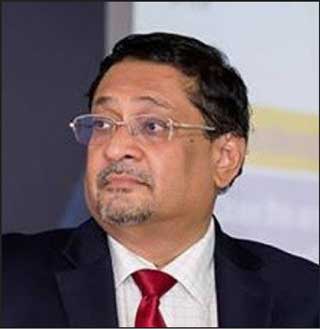Wednesday Feb 25, 2026
Wednesday Feb 25, 2026
Thursday, 26 August 2021 00:00 - - {{hitsCtrl.values.hits}}
The COVID-19 pandemic introduces new challenges for organisations looking to build and maintain a robust integrity framework. Today, policies and procedures need to be reviewed through the lens of an
 |
| EY Country Managing Partner Manil Jayesinghe |
 |
| EY Financial Accounting Advisory Services Partner Hiranthi Fonseka |
increasingly dispersed and remote workforce. The Ernest and Young (EY) Global Integrity Report 2020 reveals nine in 10 respondents believe that the pandemic poses an increased risk to ethical business conduct at their organisations.
Organisations need to do more to locate and stop unethical behaviour, and also to protect those that help do so.
Whistle-blowers – employees who expose behaviour inside their own organization – play a crucial role in uncovering misconduct. This is just one reason why policies to protect whistleblowing have migrated out of obscurity to near the top of the agenda for many senior legal and compliance professionals.
Data collected for the EY Global Integrity Report 2020 found that the vast majority respondents – 94% of the nearly 3,000 companies surveyed – had at least one element of a robust whistleblowing procedure in place. The most common was a code of conduct for how employees should behave in business (47%), followed by regular training on relevant legal, regulatory or professional standards of behaviour (38%).
At a macro level, 53% of respondents who had reported an issue felt under pressure not to report. 39% of those surveyed said it had become easier to report concerns over the past three years. Despite this, one in five respondents is more concerned about the level of protection for whistle-blowers than they were three years ago with less than one third (27%) believing that they are offered more protection.
Organisations need to understand this process – a policy alone is not enough. With whistleblowing laws and rules becoming increasingly widespread, corporations around the world need to build and enhance their current procedures.
EY Country Managing Partner Manil Jayesinghe said: “Integrating a whistleblowing policy into a firm’s culture and values in the longer-term is important. Employees feel safe when there is a comprehensive culture of integrity inside the organisation and people know that the company is committed to these values.”
A critical related concept is the ability for a company to ‘listen down’ – to actively be able to receive input and feedback from layers below executive management. This helps foster an environment where employees feel comfortable ‘speaking up’ when they see things they believe go against the values of the company. Indeed, organisations should promote a culture that treats whistleblowing as a duty and responsibility where wrongdoing or unethical behaviour is occurring.
EY Financial Accounting Advisory Services Partner Hiranthi Fonseka said: “We have seen how whistleblowing programs have benefited organisations, specially, over the last one-and-half years, when controls and processes were significantly overshadowed by the need to carry on business. Companies and their executives need to take responsibility for setting up the right environment so that whistle-blowers can come forward.”
Setting the right tone
In conclusion, Fonseka mentioned that “the whistleblowing programs form a key pillar of an organisation’s corporate governance framework, and it is critical for companies to build ethical and humane processes to handle complaints.”
She said: “By incorporating this as part of their agenda, organisations can ensure that their people don’t turn a blind eye to wrongdoing, are encouraged to speak up and are then rewarded, and not penalised for doing so. Ultimately, this will help them emerge stronger than their competitors, having retained top talent and attracted new customers even during turbulent times.
“A deep-seated cultural change indeed goes beyond lip service and minimum compliance. It takes time and effort for such cultural change. But the rewards are many, especially to preserve your business integrity amid and beyond the COVID-19 pandemic.”